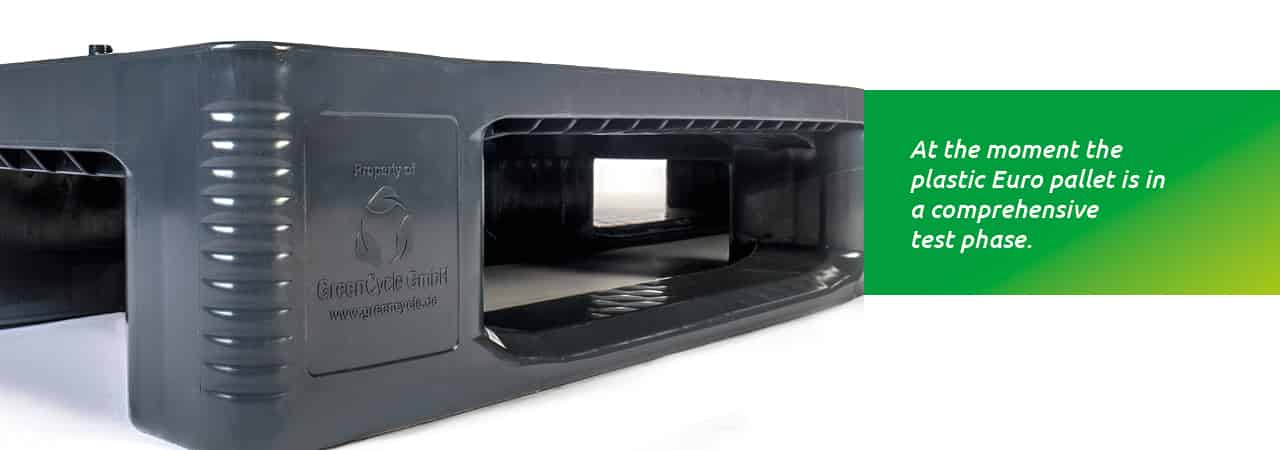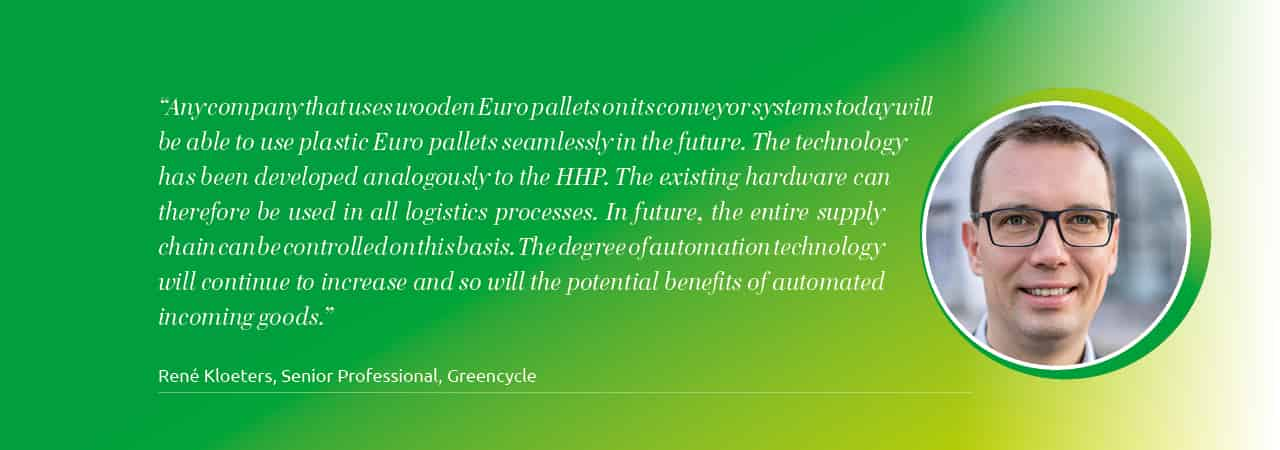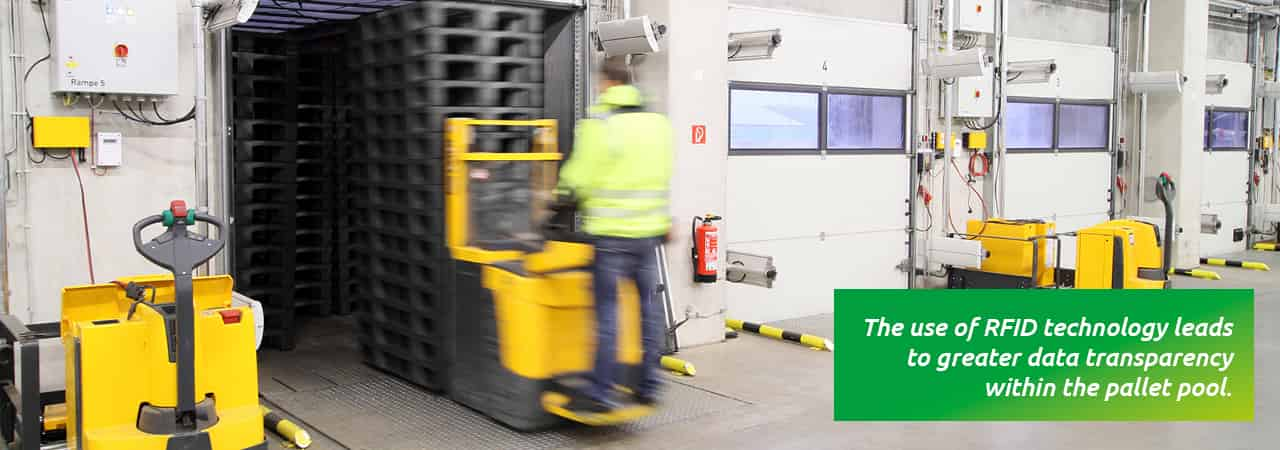14 millionen pallet cycles in Europe, 440 trucks with up to 990 pallets each per week seamlessly captured
Greencycle relies on plastic pallets – the innovative logistics solution for trade and industry. With 2.2 million pallets and 14 million deliveries per year, the Heilbronn Half Pallet (HHP), introduced in 2016, is represented throughout Europe. These pallets are durable, recyclable and cost-effective.
Two RFID transponders in each pallet enable the localization of the pallet pool and thus efficient and transparent control. Currently on the agenda: the development of a plastic Euro pallet that can replace the wood-based Euro pallet 1:1. The overarching goal at Greencycle is not only to increase transparency and efficiency within logistics, but also to achieve sustainability goals.
René Kloeters, Senior Professional, Greencycle, in an interview with RFID & Wireless IoT Global.
New plastic Euro pallet from 2020
In 2016, after a development period of three years, Greencycle together with pallet manufacturer Capka has introduced the HHP – the Heilbronn Half-Pallet – as an alternative to wooden load carriers. Over 2 million half-pallets made of HDPE plastic were rolled out on the market in 2016. Compared to the wooden pallet, this HHP has a higher fracture strength. Statistics have shown that the circulation per pallet increased significantly since then. To complement the HHP, Greencycle is currently developing a plastic Euro pallet.
The experience gained from the development of the HHP is incorporated in this development work. The new Euro pallet is intended to complete Greencycle's pallet portfolio in the future and to eventually completely replace wooden pallets. Compliant in its dimensions and requirements with the standardized Euro pallet, every company which uses wooden pallets today can fall back on the Greencycle plastic variant.
The RFID transponders integrated in each pallet guarantee the localization and tracking of the load carrier. In addition to the 'Pallets' division, Greencycle also operates the pallet pool for the HHP. This means that Greencycle administers the leasing of HHPs and controls the pallet pool. The pooling solution benefits from the localization and tracking of each individual pallet. The system is complemented by gate solutions which enable the automated identification of empty pallets on the truck bed. The entire pallet pool is controlled via cloud-based RFID technology.
Cloud-based RFID pallet pool
A total of around 2.2 million Heilbronn Half- Pallets with around 14 million deliveries pass through the pool every year. Up to 400 trucks are loaded each week. Two RFID transponders are installed in each HHP, allowing for automated contactless recording of the pallet ID. Aluminum reinforced runners ensure the stability and breakage resistance of the pallets in automated conveyor systems. With a dead weight of 6.75 kg and a load capacity of up to 500 kg, the HHP can complete around 50 cycles without damage.
Wooden pallets, on the other hand, already show the first signs of damage after two to three rounds. There are currently about 500 million wooden pallets in circulation. These are to be replaced by plastic Euro pallets in the future.
The new Euro pallets are also produced with foil runners and antislip strips and follow standardized dimensions, so that structural changes to existing conveyor systems are not necessary. Identification technologies such as barcode, RFID, and QR code are used to uniquely identify the pallets. "Both pallets – the HHP and the new plastic Euro pallet – can be detected with the existing hardware," explains René Kloeters.
Up to 990 pallets captured on the go
A truck covered with a plastic tarp drives through a gate at walking speed. Up to 990 pallets can be captured during the passage. A logistics location with only one access road is particularly suitable for the gate solution, as all incoming trucks are registered there. Therefore, decentralized locations tend to have RFID sensors installed at the individual gates rather than using gate solutions. Box trucks, which are used in refrigerated logistics, have specific requirements for the gate solution.
The insulating and metal-bearing structure of the trucks makes it difficult to achieve correct reading rates. "In this case, customer-specific solutions must be developed. Individual solutions are also possible with regard to the width of the gate. The customer can specify the gate dimensions adapted to local conditions," says Kloeters.
Rollout of the plastic Euro pallet 2020
AThe plastic Euro pallet is currently in the test phase within the Schwarz Group. This new Euro pallet is already in use in selected Kaufland stores. "The development work on this plastic pallet benefits from the experience gained from the development of the HHP, which was completed in 2016. This led to a reduction in development time," explains Kloeters. The major rollout should be completed company-wide in 2020.
Reduced downtime
A major competitive advantage offered to customers is the reduction of downtime. These occur, for example, if a pallet breaks or tips over on the conveyor system. This results in loss of goods and time. Plastic offers a durable and hygienic solution, as the material has a high breaking strength and is easy to clean.
100% compatible
The dimensions and requirements such as entry height, closed runners, block widths and deck heights are in conformity with the standardized Euro pallet. Previous plastic pallets on the market often deviate to a small extent. This means that the conveyor technology must be adapted. Kloeters underlines the advantages by explaining: "We develop a 1:1 solution without any necessary changes to the conveyor technology. We are guided by the standards and norms for forklift trucks." The existing RFID hardware embedded in the HHP can be used 100 percent.
Data transparency and competitive advantages
The use of RFID technology leads to greater data transparency within the pallet pool. Cost savings are the result. This competitive advantage is passed on to the customers. The time required for inventory is reduced and inventory accuracy is increased. Furthermore, the location of the pallet can be clearly located. Kloeters sees even more possible uses in the future: "In the future, the entire supply chain can be captured via the tagged pallet. The degree of automation technology will continue to increase and thus the potential benefits of automated incoming and outgoing goods. Greencycle offers retailers the basis and the systemic platform for the further development of the potential benefits for their own company.”
Technology
RFID labels generate digital load carriers
Both pallet models – the HHP or plastic Euro pallet – are manufactured by injection molding. In order to automatically capture the pallets on a conveyor system or when passing through a gate, both pallet models have the same form of labeling. A plastic slide is inserted into two of the four pallet feet in a diagonally opposite arrangement. An RFID label is then attached to each of these slides. The diagonal attachment of the transponders enables the highest possible detection accuracy.
The transponders are based on a dogbone inlay with an Impinj Monza 4D chip. The chip has a 128 bit EPC and a 32 bit user memory. The data on the chip is encoded according to the GS1 standard GRAI - Global Returnable Asset Identifier - which was developed for labeling returnable load carriers for management, handling and tracking. The coding of the transponders on each pallet is identical.
Strategy
Sustainability targets achieved
The HDPE plastic pallets are made of 100 percent recyclable material. Within the closed transport cycle, the Schwarz Group relies on regional warehouses. Short transport routes can be guaranteed. "We do not use our own depots, we carry out direct transports instead. The pallets are available as empty pallets in the central warehouses of Lidl and Kaufland. We then transport these pallets to our customers who need them," Kloeters explains.
This means that empty and half trips are avoided as far as possible and the entire pallet distribution is efficient. Direct transports, fully loaded trucks and short delivery distances reduce CO₂ emissions
Greencycle
The roots of Greencycle, founded in 2009 as a subsidiary of the Schwarz Group, lie in the disposal of paper and cardboard waste from Lidl branches. Today, the company is active in three business areas: Recyclables Management, Energy and Environmental Innovations, and Logistics Solutions. Greencycle is part of "REset Plastic", the plastics strategy of the Schwarz Group.
René Kloeters is Senior Professional at Greencycle which belongs to the Schwarz Group. He has been involved in logistics optimization for over eight years as a project team member and manager in various positions. Since 2014 he has been involved in the development and establishment of Greencycle's pallet pool. As a Senior Professional, he is now responsible for the technical area of Greencycle pallet pooling.







